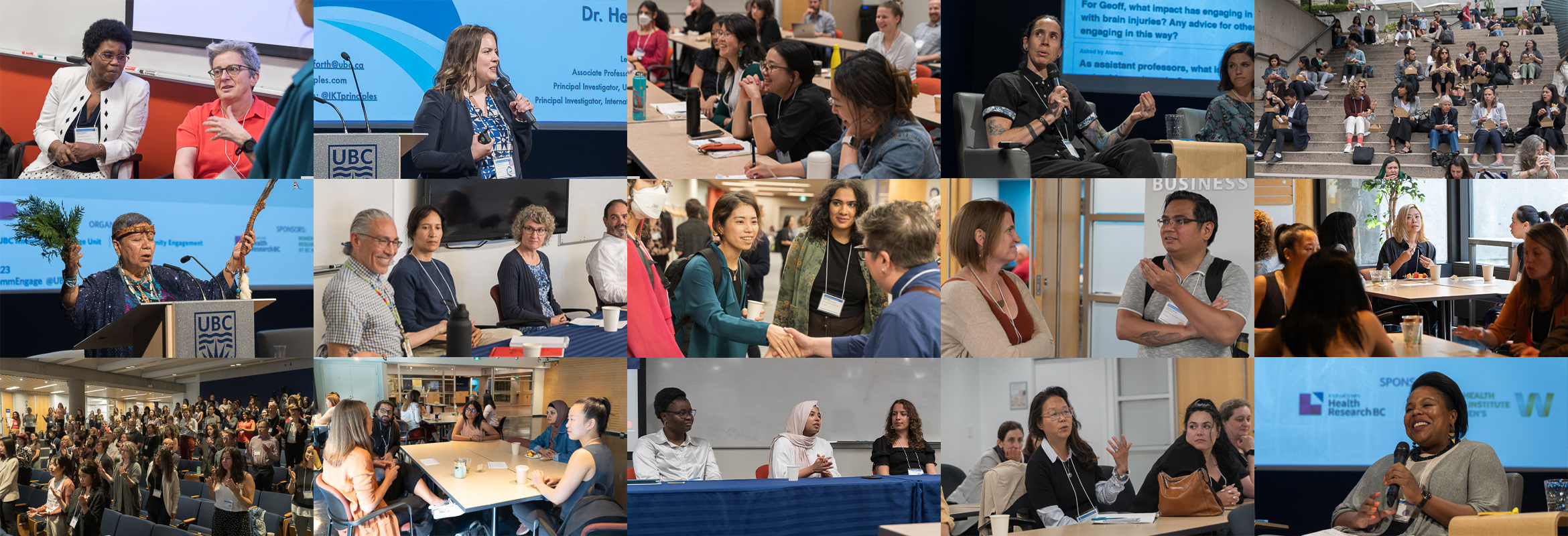Introduction from Co-Organizers
Conference participants, hosts, presenters, sponsors, and partners — Thank you!
June 15th was a high point for our teams in UBC Knowledge Exchange and UBC Community Engagement. It was also a demonstration that not only are there university and community partners who are engaged in equitable, partnered research, but there are a lot of us, and we are doing impactful work that deserves respect, examination and celebration.
Below, we invite you to relive the highlights of the day, including video recordings of the plenary sessions, photos, and key takeaways. We extend our sincere gratitude to Solana Pasqual, Sarah Lusina, and the twenty graduate students who contributed their written reflections to this report.
We are deeply honored by the overwhelmingly positive feedback we have received about the conference — that you can read about in the conference evaluation section of this report. We are thrilled to announce that our teams will be continuing this collaboration to organize future events for all of you. As dedicated teams committed to fostering reciprocal relationships and promoting impactful research, we encourage you to stay connected with us as you continue to engage in partnered research and knowledge exchange.
Sincerely,
Katie McCallum, Manager, UBC Community Engagement, & Gen Creighton, Manager, UBC Knowledge Exchange
Land Acknowledgement
We thank our hosts and acknowledge that UBC Robson Square is located on the traditional, ancestral, unceded territory of the Coast Salish Peoples, including the territories of the Musqueam, Squamish, Stó:lō and Tsleil- Waututh Nations.
Sponsors


Sections
- Conference Summary
- UBC Calls to Actions
- Photo Gallery
- Watch the Plenary Sessions
- Event Introduction & Welcome
- Meaningfully Engaging in Research: Advancing the Science and Practice of Research Partnerships
- “HIV Made Me Fabulous”: A Knowledge Mobilization Partnership using Film to Address Stigma and Advance Gender Equity in the HIV Response
- Community Assets, Reciprocity, and Other Ideas We Struggle to Believe
- Partnerships Panel: Lessons Learned in Community-University Engagement
- Graduate Student Participation
- Witness Summary
- Evaluation
Conference Summary
Written by Solana Pasqual. Solana is a UBC master’s in journalism student and freelance journalist.
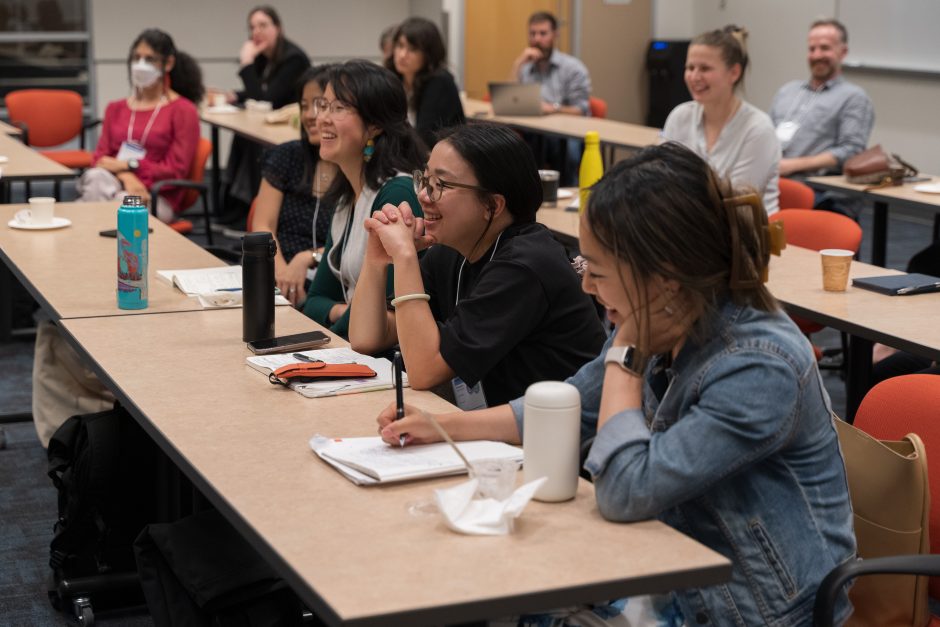
On June 15, 2023, the University of British Columbia hosted its inaugural Partnering in Research conference at UBC Robson Square where participants gathered for a full day of learning and conversation around the practice and power of equitable and engaged research with non-academic partners. Organized by the UBC Knowledge Exchange Unit and UBC Community Engagement, the conference brought together 57 speakers and 187 attendees — UBC faculty, staff, graduate students and external collaborative partners — to explore the ethical, cultural and political challenges of partnered research while developing strategies to drive real community-centered change.
Click here to read the full conference summary
The conference sought to walk the talk with keynote speeches from UBCO professor Heather Gainforth, SFU professor Angela Kaida, SFU research co-ordinator Azra Bhanji, writer, activist Juno Roche, associate provost Byron White from the University of North Carolina, and a panel featuring projects funded with UBC’s Community-University Engagement Support Fund. Concurrent sessions allowed attendees to learn from other researchers, community partners and grad students in smaller group settings, whose research included 2SLGBTQ+ youth in health research, decolonizing cross-cultural collaborations, climate justice, and community-based research and knowledge equity.
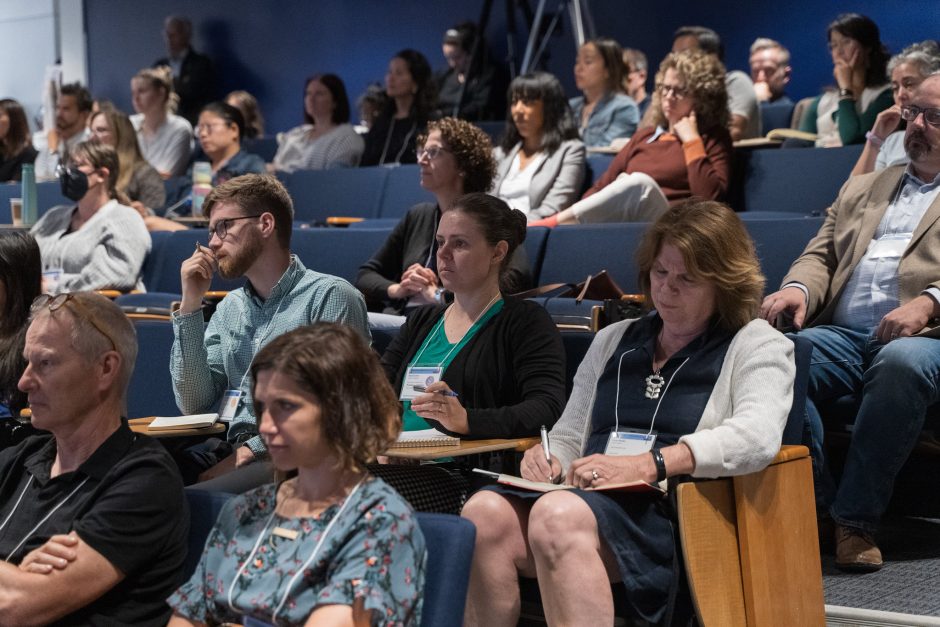
“Today, we recognize that to tackle the most pressing issues facing humanity, we need to mobilize our collective knowledge and expertise from the lab to the lived experience,” said Adriaan de Jager, UBC associate vice-president of government relations and community engagement. “We need to break down the traditional power imbalances between the academy and community to create a truly inclusive and equitable partnership in the advancement of knowledge.”
“We need to break down the traditional power imbalances between the academy and community to create a truly inclusive and equitable partnership in the advancement of knowledge”
— Adriaan de Jager, UBC associate vice-president of government relations and community engagement.
Throughout the day, researchers and students had several opportunities to share how connecting research and community had impacted their work.
Zeba Khan, a graduate student in UBC’s Department of Obstetrics and Gynecology and a panelist from the “Ask Us: Youth Voices to Improve Research” concurrent session, said, “In the non-profit space, I got to hear conversations [on accessing contraception and general sexual and reproductive health-related services] from immigrants and newcomers. I can really relate because I, myself, came here as an international student. So, that became a topic of interest for me, and I was really able to leverage that and apply to some of the wonderful funding opportunities that UBC has. We were able to use the funding to organize a series of workshops that allowed us to connect and build partnerships with other community organizations.”
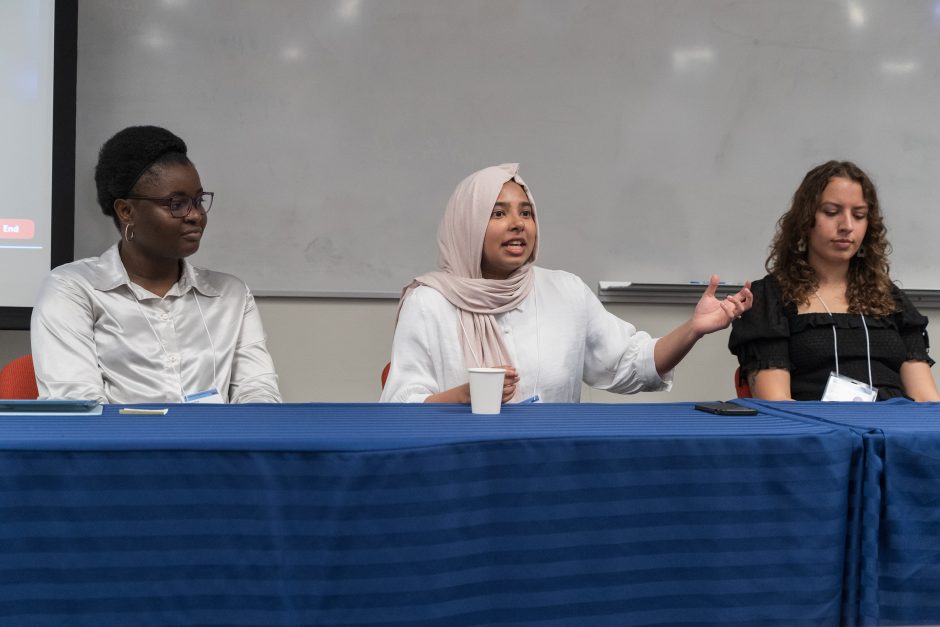
Participants also discussed challenges and barriers related to conducting ethical and reciprocal partnered research. “The traditional way of doing academic research has been slow to change,” said Heather Gainforth, ICORD principal investigator and associate professor at UBCO School of Health and Exercise Sciences. “It’s great to have decision makers here [at the conference], to have support and understand how we can make our work better. There are parts of research that will always be challenging, but this doesn’t have to be.”
Matthew Evenden, associate vice president of research, said, “What is abundantly evident from our day of discussions is that researchers and community partners engaging together works best when knowledge is thought about in reciprocal terms, as an exchange. This means forming questions together, and partnering through the many stages of research. Such an approach grounds ideas and gives focus to inquiry. It recognizes the many forms of expertise and makes impact possible.”
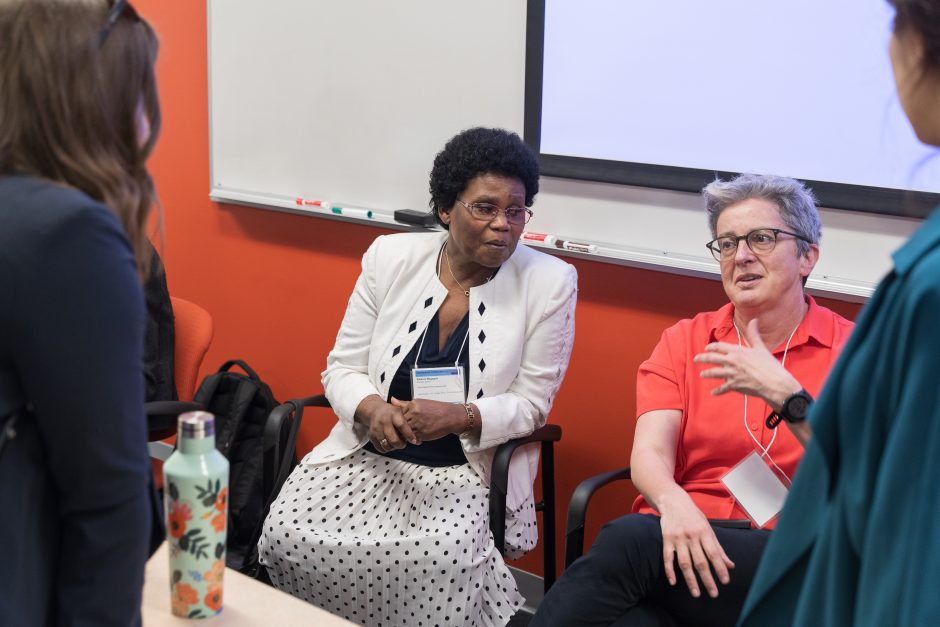
Conference participants were eager to understand where they could better inform their own research and best practices, and ensure their future research was as inclusive and diverse as possible. The conference brought together many different external partners and members who brought a valuable understanding to the partnered research theme.
Laura Kadowski, program and operations coordinator for United Way British Columbia, said, “My role is to help facilitate knowledge, translation and academic partnerships, so it’s really amazing that [UBC is] having this conference. I like the fact that students seem to be heavily involved because I feel like from an academic background, there’s a lot of younger generations involved in community-engaged research. It’s great to see students help work with these ideas.”
“It’s really amazing that [UBC is] having this conference. I like the fact that students seem to be heavily involved because I feel like from an academic background, there’s a lot of younger generations involved in community-engaged research.”
— Laura Kadowski, program and operations coordinator for United Way British Columbia
The Partnering in Research conference was an important milestone in bringing together diverse individuals passionate about partnered research from all across British Columbia. Through connection and shared values, the conference allowed conversations on how the parameters of research, community, and engagement can be redefined to allow everyone a seat at the table.
UBC Calls to Actions
Whereas the conference was about connection and learning, throughout the day conference attendees called on UBC to improve its system of supports for equitable and mutually beneficial collaborations between faculty, students, staff and community organizations, including formal recognition, mechanisms for compensation and partnership development supports.
Attendees shared their perspective on how UBC can better support partnered research through a post-event survey that was circulated at the end of the conference. Using a qualitative analysis of key themes that emerged in attendee responses, feedback has been summarized into the following 8 calls to action:
Create Programs and Resources to Help Build Inclusive Partnerships
Participants want UBC to offer partnership and relationship-building training, guidelines and other useful resources to help equip researchers and staff with the skills and knowledge they need to do effective and ethical collaboration and partnership. To this end, they called on UBC to actively develop and advance best practices for community-based research and teaching, recognize community partners as equal collaborators, and invest in a university-wide culture that values and respects community contributions and community-university partnerships.
Recognize and Showcase Community-University Partnerships
Participants suggest that UBC develop mechanisms to routinely and publicly acknowledge, value and showcase partnership contributions, approaches, achievements, and impacts.
Formally Recognize and Compensate Community and University Partners
UBC should establish systems to formally recognize, reward, and compensate faculty, staff, students, and community partners for contributions in partnered research. Formal systems for rewards and recognition should be designed to acknowledge the context and challenges of community-university partnerships and formally recognize these as scholarly achievements. UBC is also called on to identify and address burdens and barriers in current financial compensation and reimbursement systems, so the expertise, efforts and contributions of community and university partners are appropriately remunerated using streamlined payment and reimbursement mechanisms.
Increase Funding and Resources
UBC should allocate increased funding and resources specifically for community-university partnerships and ensure that available resources are accessible and effectively supportive of sustainable partnership initiatives. In addition to financial resources, UBC should also allocate non-financial resources, including staff time, to enable and empower successful collaborations.
Promote Indigenous Knowledge and Contributions
UBC should actively promote, share, recognize, and publish Indigenous knowledge and the contributions of Indigenous community partners in partnership with Indigenous communities and organizations. The purpose of this work should be to respect and uplift Indigenous perspectives, traditions, and expertise in all aspects of research and engagement.
Support Graduate Students in Partnered Projects
UBC should provide additional support, training, and resources for graduate students who are engaged in partnered projects, or interested to participate in engaged research. The university should establish supports to address specific needs and challenges of graduate students and community partners to ensure both receive the necessary supports that can help these kinds of community-university research collaborations to thrive.
Engage Community Experts
UBC should create platforms and opportunities to recognize and acknowledge and incorporate community expertise, experiences, and knowledge into all aspects of partnered research initiatives.
Secure Buy-in and Support from Decision-makers
UBC needs to secure buy-in and support from UBC decision-makers to enable successful development and sustainability of community-university partnerships and the above calls to action. UBC leadership should actively advocate for the value and significance of community-university partnerships and their alignment with UBC’s mission and values.
Photo Gallery
Click through the images using the arrows below or go here to view the full photo gallery
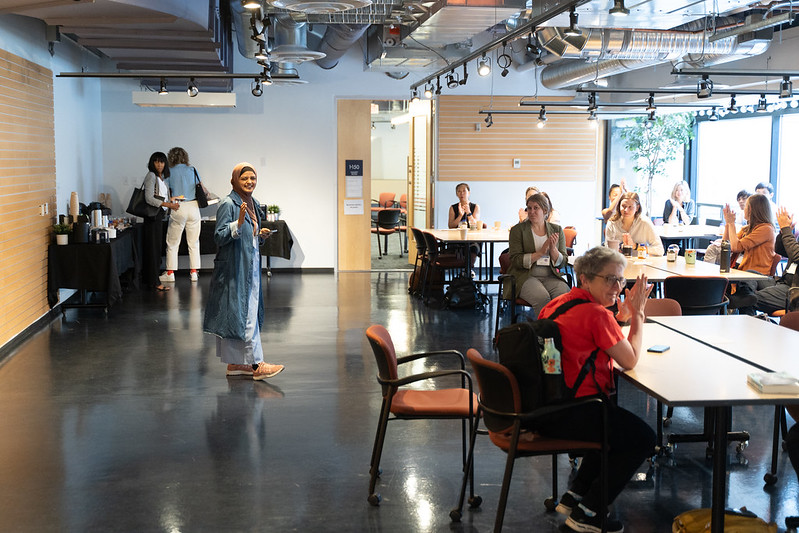
Watch the Plenary Sessions
Event Introduction & Welcome
Speakers:
- Genevieve Creighton, Manager, UBC Knowledge Exchange
- Katie McCallum, Manager, UBC Community Engagement
- Roberta Price, Coast Salish Matriarch, and Elder of the Snuneymuxw and Cowichan Nations
- Gage Averill, Professor, Provost and Vice-President, Academic, UBC Vancouver
Meaningfully Engaging in Research: Advancing the Science and Practice of Research Partnerships
Speaker:
- Heather Gainforth, ICORD Principal Investigator & Associate Professor, UBCO School of Health and Exercise Sciences
Research partnerships span diverse research disciplines, identities, locations, and/or contexts with a strong focus on research that serves equity-deserving groups. To ensure research is diverse, equitable, inclusive and impactful, research that advances best practices for meaningfully engaging partners throughout the research process must be prioritized. Addressing this need, Dr. Gainforth discussed how the Integrated Knowledge Translation (IKT) Guiding Principles for conducting and disseminating spinal cord injury (SCI) research was co-developed to combat tokenism and support meaningful engagement.
Click here to view a summary of key takeaways
- Engaging in partnered research can be challenging when systems don’t adequately support it, which causes researchers to feel like they’re swimming upstream and working against a current.
- The IKT guiding principles approach is about coming to partnered research in a spirit of caring for each other and asking, “How can I help?” to get at ways that we can support each other and make use of the skills and knowledges we each have in the context of partnership and collaboration.
- Partnered research involves diverse stakeholders, including individuals with lived experience, community and advocacy organizations, research funders, community members, and researchers from various domains.
- The review of reviews on partnered research was completed by a diverse team that included researchers, funders, people with lived experience; it revealed an increasing emphasis on researchers partnering with knowledge users and stakeholders throughout the research process.
- The lack of reporting on the process of partnered research is a challenge, as outcomes are often highlighted without discussing the “how.” We are good at sharing what we did and why we did it, but not so good at our process—the how—which is crucial for making changes to support and improve partnered research.
Click here to view the IKT 8 Guiding Principles
- Partners develop and maintain relationships based on trust, respect, dignity, and transparency.
- Partners share in decision-making.
- Partners foster open, honest, and responsive communication.
- Partners recognize, value, and share their diverse expertise and knowledge.
- Partners are flexible and receptive in tailoring the research approach to match the aims and context of the project.
- Partners can meaningfully benefit by participating in the partnership.
- Partners address ethical considerations.
- Partners respect the practical considerations and financial constraints of all partners.
“HIV Made Me Fabulous”: A Knowledge Mobilization Partnership using Film to Address Stigma and Advance Gender Equity in the HIV Response
Speakers:
- Angela Kaida, Faculty of Health Sciences, Simon Fraser University, Professor
- Azra Bhanji, Simon Fraser University, Research Co-ordinator
- Juno Roche, Writer and Activist
HIV Made Me Fabulous is a 10-minute film that tells the personal story of Juno Roche, a writer, activist, and trans woman, who has been living with HIV for over 25 years. Grounded in HIV science, the film uses embodied storytelling to induce emotional and physical responses in viewers to promote compassion, support a greater understanding of the gendered intersectional experiences of living with HIV, and motivate viewers to address HIV stigma. This session included a presentation on the use of a social justice informed arts-based knowledge translation strategy implemented research partnership, a screening of the film, a discussion with community, trainee, and academic research partners of the team, and audience Q&A.
Click here to view a summary of key takeaways
- HIV affects more women than men globally, contrary to popular belief. There are more women living with HIV worldwide. Estimates indicate that approximately 19.3 million women are living with HIV globally, with the number increasing in Canada as well.
- The U equals U (Undetectable equals Untransmittable) campaign has been transformative in the HIV response. It emphasizes that individuals living with HIV, who have an undetectable viral load due to suppressive antiretroviral therapy, cannot transmit the virus to their sexual partners, a new understanding that has not yet circulated across the society.
- Gender inequities persist in the HIV response, despite advancements in HIV treatment and prevention. Women have not equally benefited and continue to face gendered inequities in engagement in care, survival, and experiences of stigma and violence. Addressing these inequities is crucial to reducing discrimination and promoting gender equity in the HIV response.
- The community research partnership screened their film, “HIV made me fabulous,” to address HIV stigma and enhance gender equity in the HIV response. It involved a close collaboration between researchers, individuals living with HIV, filmmakers, and community organizations. It is narrated by writer Juno Roche and was produced and directed by Edmund Kilpatrick.
- The film was produced as part of a broader research and knowledge translation project that aims to amplify the voices and experiences of individuals living with HIV, particularly those who have been marginalized and stigmatized. The film not only raises awareness about U=U but also stimulates critical thinking about deeper issues such as patriarchy, intersectionality, and stereotypes. It encourages reflection and change in how people interact with others.
Community Assets, Reciprocity, and Other Ideas We Struggle to Believe
Speaker:
- Byron White, Urban Research and Community Engagement, University of North Carolina Charlotte, Associate Provost
Researchers use language about reciprocity and community assets in nearly every grant proposal, statement of purpose and presentation related to university-community engagement. And yet, in our engagement efforts, there is a fundamental inequity between community and the university and community assets often overlooked or considered less essential. Despite progress toward more democratic practices, the dominant framework for university-community engagement continues to view the community as deficient and in need of fixing, and its residents as clients rather than knowledge producers.
Dr. White’s address explored why rhetoric and convictions often fall short of practice, and what we can do to walk our talk. It explored barriers that universities face in pursuing reciprocity and strategies for sharing authority, responsibility and accountability with community partners.
Click here to view a summary of key takeaways
- While institutions are focused on strategy and mission-oriented action, communities are centered around caring. Institutions need to learn to value community care as an asset and understand its importance in their collaborative work with communities.
- It is critical that institutions recognize and acknowledge the challenges they face in relation to care. Partnerships are a critical tool to help institutions to reconcile the different ways they work compared to communities.
- Institutions often struggle to accept ‘community-as-experts’ and tend to view themselves as the primary source of expertise. They should shift their perspective and recognize the expertise within the community, finding shared roles and building on existing community expertise.
- Institutions should view the community as abundant rather than deficient, fostering a reciprocal and collaborative approach. This mindset shift can improve partnerships and outcomes.
- Reciprocity happens when institutions concede a monopoly on expertise and recognize the capacity to care in the community. This shifts from thinking about what a community knows, which can be extracted by the institution, to what can a community do that an institution cannot.
- Institutions should actively seek to join existing community discussions and tables, co-creating collaborative relationships based on community agency and expertise. Overcoming challenges and navigating institutional constraints together can lead to more meaningful and effective partnerships.
Partnerships Panel: Lessons Learned in Community-University Engagement
Speakers:
- Andrea Bundon, UBC School of Kinesiology, Assistant Professor (moderator)
- Julia Schmidt, Occupational Science and Occupational Therapy, Assistant Professor
- Geoffrey Sing, BC Brain Injury Association, Chairperson
- Onyx Sloan Morgan, Community, Culture, and Global Studies, UBC Okanagan, Assistant Professor
- Jasleen Grewal, University of British Columbia, PhD Student
This panel discussion focused on cases of successful community-university engagement. Two partnerships supported by the Community-University Engagement Support (CUES) Fund discussed how they ensure that community priorities are embedded in community-based research partnerships; nothing about us without us.
Click here to learn more about the featured projects
Alhgoh ‘uts’ut’en: We all work together:
Despite being federally recognized as a First Nation Band in 2019, Binche has governed its keyoh (territories used and managed by specific families) since time immemorial as guided by Dakelh law, culture, and customs. For decades, however, extractive industry–forestry and mining–has benefited from Binche keyoh, leaving intergenerational impacts on community members, more than human kin, lands, water, and air.
Theresa Morris, Pinchi Mine Legacy Lead, and Onyx Sloan Morgan, Assistant Professor, Community Culture Global Studies UBC-O, are partnering on a project titled “Alhgoh ‘uts’ut’en: we all work together.” This project aims to support Binche Keyoh Bu Society in upholding their responsibilities and ensure the Nation’s priorities are reflected in decisions made across their keyoh (territories). By engaging community members, such as Binche Keyoh Holders, Elders and Knowledge Keepers, the project partners are ensuring that priorities set for the keyoh will embolden Binche self-determination for future generations.
Creating a unified community and research agenda to support people with brain injury:
Brain injury is the number one cause of death and disability in people under the age of 45 in Canada. In British Columbia alone, approximately 35 individuals sustain a brain injury each day. These people often experience mental health issues and addiction, alongside the impairments related to their brain injury such as poor balance, difficulty communicating, and decreased memory. It is well-known that brain injury is often experienced alongside mental health issues and addiction, leading to poor quality of life, morbidity, mortality, and financial hardship.
There are two main obstacles in brain injury rehabilitation: much of the research to date has not aligned with the needs expressed by the community, and, equally, many community programs have not yet embedded evidence into the programming that supports this population. It is important to create a unified partnership between community and research programs to better address the needs of people living with brain injury in BC.
Geoff Sing, President, BC Brain Injury Association in partnership with Julia Schmidt, Assistant Professor, Faculty of Medicine and Jasleen Grewal, Occupational Therapist and PhD trainee, Rehabilitation Science at UBC are working on creating a unified community and research agenda to support people with brain injury. This partnership is working to develop a consensus on the priorities of people with brain injury, mental health issues, and addiction and ensure that researchers and the community work in tandem to meet their needs.
Click to here view a summary of key takeaways
- Building relationships and finding partners with shared interests and passion is essential for successful collaborations.
- Involving community organizations and members throughout the research process ensures alignment with their needs and priorities.
- Grant calls that prioritize partnership building over predetermined research questions are invaluable for establishing and nurturing community partnerships.
- Remember: it is not surprising communities struggle to trust academic institutions. Mutual respect, trust, and open communication are vital in community-university partnerships; create an environment that addresses this mistrust and allows good collaborative work to happen through mutual respect and open communication.
- Challenging moments should be expected, and addressing them with open communication and learning from them is crucial for maintaining accountability and adjusting the approach based on community feedback.
Graduate Student Participation
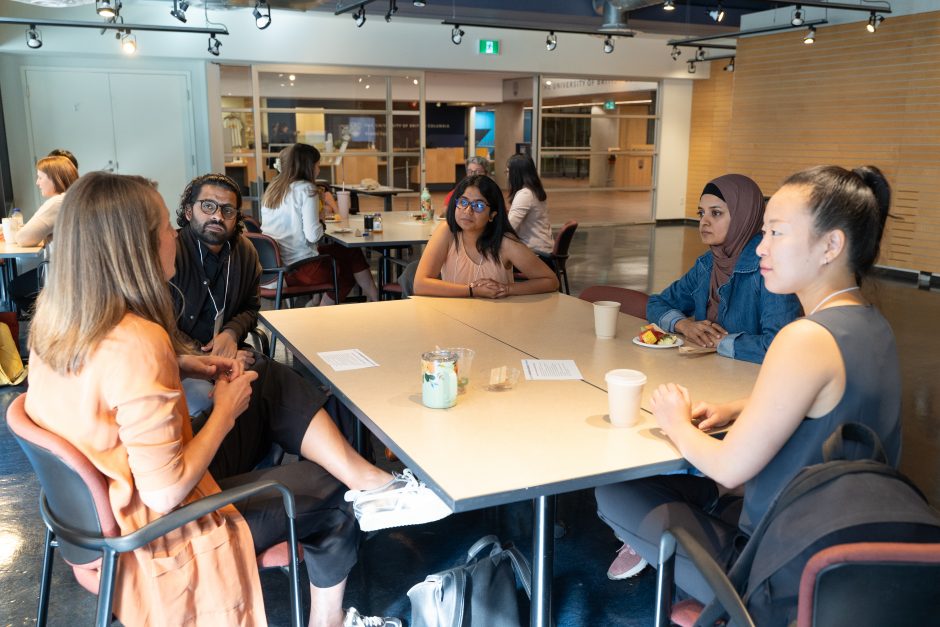
A key objective of the conference was to provide graduate students with opportunities to connect with and learn from community partners, policy makers, and engaged scholars. A special mentorship breakfast was organized exclusively for the graduate students, providing a platform for co-learning and meaningful interactions. The breakfast featured six fantastic mentors from diverse disciplines and sectors, who shared valuable insights on their inspiration for engaged scholarship, opportunities within their sectors, tips for overcoming challenges, and advice on leveraging their studies for career enhancement. This opportunity allowed the students to gain valuable knowledge and guidance to further their academic and professional journeys.
“Attending the Mentorship Breakfast was an eye-opening experience. Speaking with professionals from various sectors, I realized the immense value of long-term, partnered research that extends beyond single projects. It opened my mind to the potential for impactful collaboration.” —Ellen Wang
A special shout out to our exceptional graduate student advisory members, Ema Fatima, Naomi Maldonado-Rodriguez, Dollina Dodani, and Samantha Graham. Their invaluable contributions were instrumental in the success of the mentorship breakfast. From selecting mentors, developing the program, and ensuring the smooth operation of the event, their dedication and efforts played a crucial role in creating a meaningful and impactful experience for the grad students.
Student Reflections
Recognizing their valuable contributions to partnered research and their unique perspectives, we invited the attending graduate students to share reflections on the conference sessions. We have attempted to capture the perspectives and insights of these students in the 8 statements below, along with a few key testimonials.
Build Trust and Respect as a Key Foundation of Partnership
Foster authentic and reciprocal community engagement by establishing trust and respect for each partner’s role and expertise.
Student Testimonials:
“The inclusion of partners is not for fulfilling a grant requirement but rather for enriching and contextualizing the research, and ensuring the work will be meaningful to the community. ” — Bonnie Leung
“I had a real eye-opening conversation with Carolyn Canfield [who] shared insight from her own experiences as a patient partner and said, “trust is built when all parties share their vulnerabilities”. However, it takes time to cultivate relationships that allow seldom heard and underserved groups to become open to disclosing sensitive information.” — Ellen Wang
Simplify and Make Research Accessible
Simplify research work to engage a wider audience by avoiding complex terminology that hinders understanding and makes research less accessible.
- This includes adopting Integrated Knowledge Translation (IKT) principles, taking care of one another, respecting and understanding knowledge user and stakeholder language and ways of communicating, and embracing diverse forms of knowledge mobilization and dissemination outside of academic norms, such as grey literature publications, arts-based approaches, visual displays, and storytelling.
Student Testimonials
“Sometimes you have to tone down some language in order to bring a diverse group of decision-makers and researchers together with the ultimate view of making change over time.” — Alysha McFadden
“There is value in publishing grey literature to increase access to a broader audience and to decolonize knowledge. Community review can also be used to validate work/knowledge for dissemination.” — Bonnie Leung
To Do Partnered Research Right, Confront and Address Tokenism and Power Imbalance
Recognize and address the challenge that tokenism and power imbalance play in research partnerships by fostering empathy and openness, investing in power-sharing, and acknowledging and managing privilege.
Student Testimonials:
“Partnering in research is a long-commitment, not a one-step process … engage the partners in the decision-making process throughout.” — Jalisa Karim
“It is time we think about equity through an intersectional lens to better understand the disproportionate barriers and compounding forms of oppression that individuals along the socioeconomic spectrum experience face. Partnered research needs to move away from outcomes of productivity and generalizability towards relationality and adaptability. Biases are inherent, but not necessarily bad. The same can be said about privilege. It is about how we use our voices or hold space for others.” — Ellen Wang
Find the Right Communities and Lean on the Right Engagement Practice
Seek out communities and individuals who appreciate and value research, allowing for a positive and meaningful process to unfold. Mix and match engagement techniques based on the communities you work with and be flexible depending on what works best for each project, individual and group.
Student Testimonials:
“[Engaging with] 2SLGBTQ+ youth [meant using] varying “flavours of youth engagement” including hiring them as co-investigators or staff, partnering with community organizations doing the work, creating youth advisory groups, engaging youth as data collectors and co-facilitators of focus groups or interviews, through peer-led intervention work, as co-authors and co-presenters, and as artists for the knowledge dissemination techniques. In this way, youth are engaged meaningfully in a wide variety of roles as fits each of the projects underway and the needs of the youth themselves.” — Lindsay Goodridge
“[There are] different ways of conceptualizing partnered research and a more critical frame of reference beyond … knowledge mobilization and implementation science writ large. [A] critical stance and continuous reflexivity about the epistemological terrain of knowledge mobilization are needed to steer us (researchers, trainees) away from the ‘tick-box exercise’ that knowledge mobilization and implementation science risk becoming.” — Ismalia De Sousa
Collaboration Leads to Impact
by collaborating on research, communities and universities can build strong connections to ensure research design and results are more relevant and achieve more meaningful societal impacts. The community holds valuable knowledge—researchers should approach communities with humility and a willingness to assist, rather than assuming a savior role.
Student Testimonials:
“ … partnering in research leads to more relevant research, stronger connections, and overall greater impact in everyone’s lives.” — Alanna Shwed
Take the Time to Explore Community-Engaged Research Opportunities
Explore networks, events, programs, supports and resources that seek to advance community-engaged research and look for ways to engage with new people, build relationships and get involved.
Student Testimonials:
“Keep going – keep making and sustaining relationships and ethical and reciprocal partnerships. You never know what will happen! ” — Alysha McFadden
“[We need to] remind ourselves that there’s nothing that we [can] think or suggest that communities haven’t already been thinking about it.” — Ismalia De Sousa
It is Critical to Talk about Sharing Decision-Making and Influence
Partners should actively listen to each other and consider diverse ideas; community-university partnership is about taking a more empathetic and community-centered approach and providing ways for all those involved to have influence and decision-making power in relevant areas.
Student Testimonials:
“UBC has some great scholars doing really innovative stuff, including listening to Indigenous leaders, scholars, Elders, and community members on how to respectfully engage with Indigenous peoples in terms of sharing knowledge, appropriate processes and protocols that extend the gamut of research processes, including publication” — Alysha McFadden
“Community engagement should begin at the conceptualization of the project and continue throughout the process … Decision-making and leadership should be shared among partners.” — Bonnie Leung
Supportive Institutional Structures are Needed
We need concerted effort at UBC and across the public sector to advocate for changes to more effectively support community leadership and meaningful long-term relationship-building with communities. At UBC, this includes more financial supports for community-engaged programs and initiatives and continued alignment of institutional actions with protocols and recommendations, particularly with Indigenous protocols and calls to action.
Student Testimonials:
“We need support from systems [and] an equity and justice audit of the institutions we work in and as researchers …. We also need better reporting on the strategies people are enacting in this work.” — Alanna Shwed
“In one session they pointed to the need for fundingfor things like, “salary for youth engagement, stipends for advisory members, food and transit for meetings, potential resources for life support such as helping them get bank accounts. [Faculty] may need to consider additional supports acknowledging trauma and precariously housed and unhoused youth … Build it into your budget and timelines, justify it as the absolutely most important thing to be able to do this work.” — Lindsay Goodridge
Witness Summary: Reflections on Moving Forward
Written by Sara Lusina
Speakers:
- Lerato Chondoma, Associate Director for the Indigenous Research Support Initiative
- Adina Spivak, Manager Community at the Sarah McLachlan Foundation
- Dr. Paul van Donkelaar, Associate Vice-Principal Research, UBCO
Bringing their own unique and valuable perspectives, Lerato Chondoma, Associate Director for the Indigenous Research Support Initiative, Adina Spivak, Manager Community at the Sarah McLachlan Foundation and Dr. Paul van Donkelaar, Associate Vice-Principal Research, UBCO were tasked to listen extra hard over the course of the conference for key learnings that can guide next steps in meaningful and impactful partnered research at UBC. The panel was asked three broad questions with respect to partnered research: Who does this work? What happens to us when we do this work? What opportunities do you see moving forward?
The panel’s reflections are summarized into key themes, below:
Acknowledging our roles
The panel opened up by acknowledging their own positionality—ethnicity, gender, job roles, and more—and how each person’s experiences inform their perspectives, knowledge bases, and modes of engagement at work. Lerato and Paul highlighted the responsibility that we each hold in our roles at the university as faculty, administrators, and staff and how important it is to respectfully engage with one another and empower one another in the roles that we perform on behalf of the university. When working with external collaborators in community, we must recognize the perceived power and privilege that comes with being associated with the university. As representatives of the university, we must be aware that we are part of a system that has traditionally excluded and oppressed certain communities and ideas. By showing up in community-based work as one’s ‘whole-self,’ while maintaining professionalism, we can humanize our work, which can lead to more authentic partnerships and impactful research outcomes.
In thinking more broadly about roles, the panel reflected on the role of the academy in community. Indeed, the academy is purposed to engage in creating solutions to the most pressing issues of our time. In partnered research, sometimes the most impactful role we can play as representatives of the university is to facilitate the convening of leaders around pressing issues and remove barriers for action so that community can create solutions for themselves.
From scarcity to abundance
The panel noted that many of the partnered research projects featured in this year’s conference were conducted with communities facing oppression and strain. With research as a tool in addressing adversity, communities were flipping the conversation from scarcity and deficit to that of abundance. A key to successful collaborations was recognizing that communities being engaged in the research process are actually the deep experts on the issues being addressed. Seeing community as expert is pivotal to productive and impactful outcomes for all. Authentic research collaborations help to surface stories of hope and joy as well as identify viable and durable solutions.
Energized by change makers
Over the course of the conference, it was clear to the panel that partnered research is led by change makers willing to share power and create space for untethered learning. Whether a community collaborator or a lead research investigator, those engaged in partnered research are visionaries. They are creative and vibrant. They are generous. They find productive ways forward to make the projects work, keeping community benefit and research excellence at the core of all they do. They find joy and energy in training the next generation of scholars, in building skills in community, and in learning with and from community. Those engaged in partnered research overcome fears of ‘uncertainty.’ Research in community is not as predictable as research in a laboratory—we cannot anticipate and control for all variables. Despite challenges from all angles, including administrative procedures, funding scarcity, communication hurdles, and more, those engaged in partnered research are at the forefront of innovation and are well positioned to create lasting, meaningful impact for society.
Shifting systems to foster societal impact
At present, the current design of academic research and the academy do not support partner engaged research, therefore limiting the university in meeting its goal of creating positive impacts for society (the foremost purpose of a public university). Tenure and promotion guidelines do not always appropriately value partnered research. Partnered research takes time and there is not always a guarantee that there will be a “productive” outcome: a grant acquired, a paper published in a high impact journal, a trainee thesis completed. In the tenure and promotion review, the university must find a way to recognize the partnered research process and in turn appropriately reward people for doing this kind of work.
The panel also heard that more funding streams to support partnered research projects are needed. The funding streams that do exist are oversubscribed and are barely adequate to meet the full scope of activities in partnered research projects. University administrative procedures that are intended to support partnered research are not always appropriately responsive and can clash with equity and inclusion values that underpin partnered research projects. To enhance partnered research, numerous simultaneous shifts within the university systems are required. At a policy level within the university, a decolonization and racism audit and associated action plans would support enhanced partnered research endeavours.
Deepening and expanding connections
Across all levels—from senior decision makers to operational staff and students in all disciplines—the university needs to make partnered research a top priority if societal impact is the goal. The Knowledge Exchange Unit at the Vice President Research & Innovation Office as well as the Community Engagement at the Vice President External Relations Office are logical locations for which to deepen and expand this work. To facilitate partnered research endeavours, the university must continue to create connections amongst researchers and staff across faculties and departments. There would be so much value in making the ‘Partnered Research Conference’ an annual event while also pursuing informal interactions, such as social events and communities of practices. These initiatives would foster the development of relationships and would lead to knowledge sharing, thought leadership, and the advancement of best practices in partnered research. In turn, UBC will be seen as a leader in research with immediate and meaningful societal impact.
Evaluation
We asked, “What did you learn/gain today?”
Beyond the benefits we asked about in the survey, attendees shared other learnings and insights from the conference, including a renewed commitment to critical reflection, collaboration, and transformative approaches in their work, a desire to decolonize practices, join or access professional networks, apply new techniques for reflection, explore emotional aspects in their work, and expand on engagement practice in research.
- 35.21% | Learned about CUES
- 42.25% | Knowledge of supports and resources
- 50.70% | Learned about initiating/sustaining partnerships
- 60.56% | Connections with individuals/organizations
- 67.61% | Understanding of challenges/opportunities
- 70.42% | Awareness of partnered research
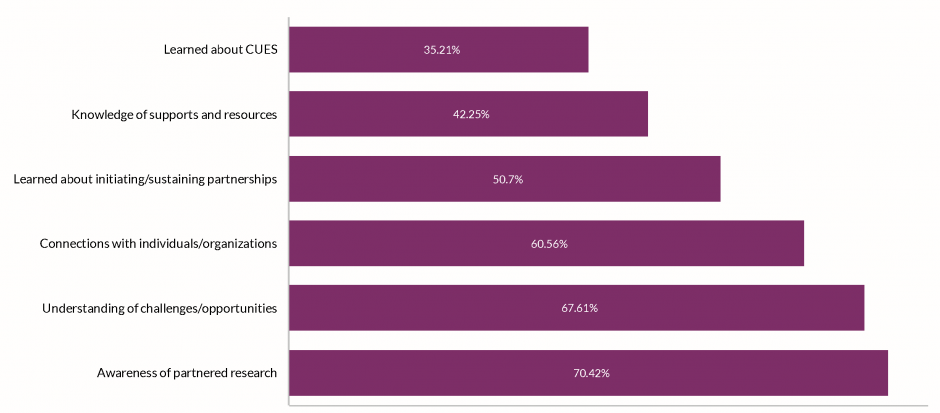
Attendees felt we achieved the following goals
- 77.46% | Professional and personal development and networking
- 85.92% | Diversity of presenters and attendees
- 87.32% | Indigenous engagement, reconciliation and decolonization
- 88.73% | Equity, diversity and inclusion
- 90.14% | Diverse ways of knowing and knowledge
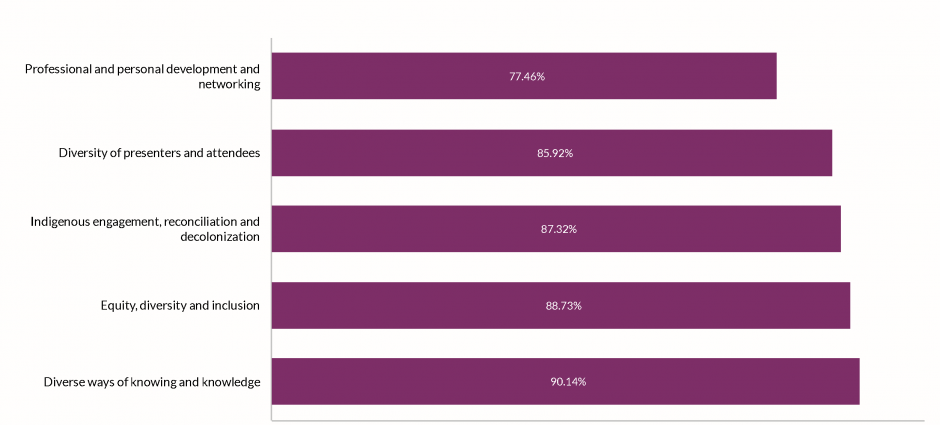
Attendees want to act on what they learned/gained
Many conference attendees felt compelled to act in the following ways after the conference to continue or start new engagement, networking, collaboration, and reflection, and to support improvement in the fields of knowledge exchange and community engagement. They are interested in applying new knowledge and understanding and to build on connections as foundations for potential partnerships and projects in the future.
- 14.08% | Initiate or join an existing project
- 38.03% | Make changes to a partnership
- 50.70% | Build or start a new partnership
- 78.87% | Attend future Knowledge Exchange and Community Engagement Events
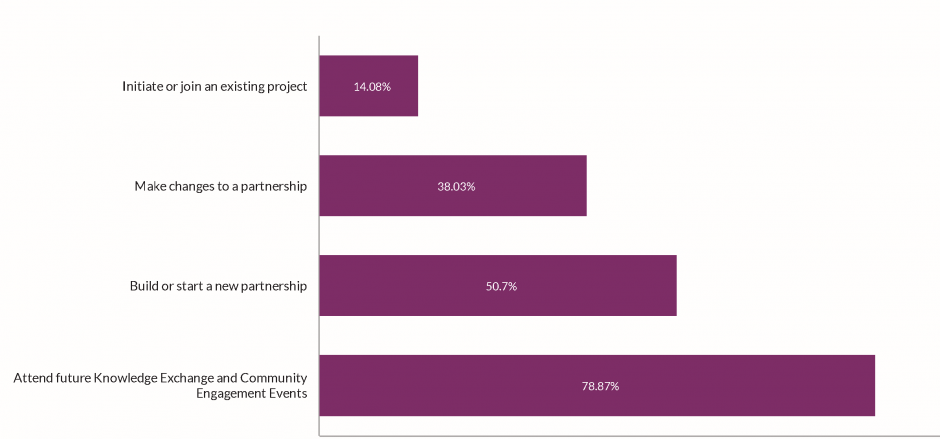
Should this be an annual conference?
- 72% | Yes, absolutely
- 22% | Yes, with changes
- 6% | No
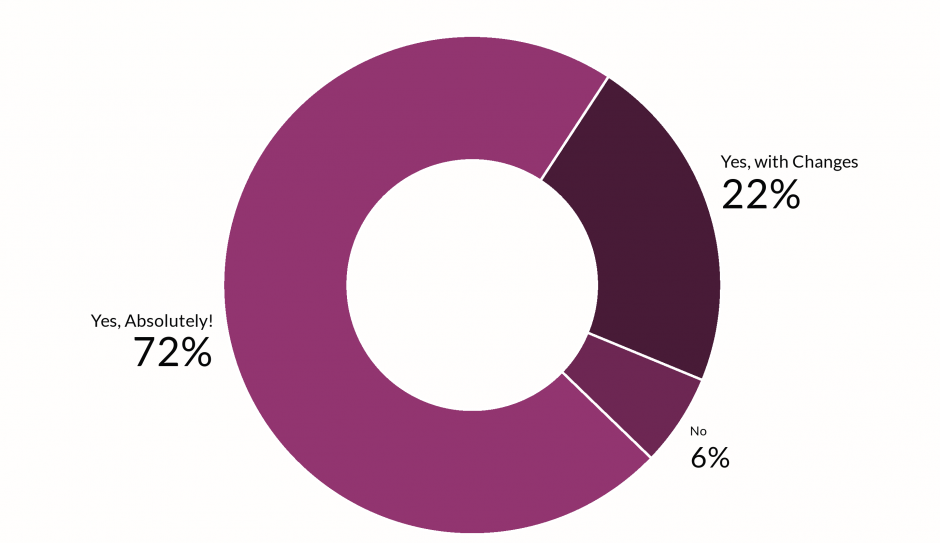
Recommendations for Future Conferences
Support Interaction and Engagement
- Create categories for attendees to promote interaction, connection and knowledge-sharing within and across sectors and disciplines.
- Design programming for more interactive and structured networking and relationship-building; there was concern about relying on the coffee break format for networking.
- Include Peer-to-Peer Networking.
More Variation in Presentation and Session Structure
- Keynotes and Diverse Breakout Sessions, with Slight Over-Emphasis on Health—needed more disciplinary diversity, for instance covering topics such as food, climate, arts, law, public policy, engineering, etc.
- Hold more practical sessions for attendees that facilitate connection and discussion between attendees with aligned goals and interests
- Showcasing Partnerships and Transformative Power, including other formats (e.g. presentations, peer-to-peer networking)
- Better balance of Academic Perspective vs. Community Partners’ Perspectives and Contributions.
Considerations for Conference Structure/Planning
- Set a comprehensive approach/definition to partnering in research to speak to wide array of sectors and disciplines.
- In-person conference format made having remote speakers challenging
- Hold conference regularly (annually or bi-annually)
Improvements to Inclusion, Accessibility, and Logistics
- Increase presence and visibility of Community Groups/Individuals’ by increasing the ratio of partners as attendees, presenters and conference planners/volunteers.
- Signage, Sign Language Translation, People with Brain Injuries; larger font size on nametags.
- Greater Representation of Indigenous Elders/Knowledge Keepers
- Microphones in Classrooms.
- Provide more food options and refreshments and ensure adequate stock throughout the conference.
Improve the focus on and visibility of community throughout all aspects of the conference
While community partnerships were the focus of the conference and community attendees were included as both presenters and attendees, survey respondents strongly recommended further enhancing the visibility of community engagement and community representatives in all aspects of the conference. Specifically, they emphasized:
- The importance of including community partners in the planning stages
- Creating opportunities for interaction and collaboration with and for community representatives.
- Showcasing the number and diversity of community partners and partnerships.
- Incorporating Indigenous knowledges, knowledge keepers/Elders and perspectives throughout more of the day.
- Recognizing the need for capacity building to support community organizations in their engagement with UBC.
- Increasing visible community representation as presenters, particularly in keynotes, and in overall ratio of partners to researchers in attendance.
Thank you!
Thank you to all the participants, hosts, presenters, sponsors, and partners that made this conference possible!
Contact Us
Community Engagement
Email: community.engagement@ubc.ca
Twitter: @UBCCommsEngage
Knowledge Exchange
Email: kx.support@ubc.ca
Twitter:@UBCKx
